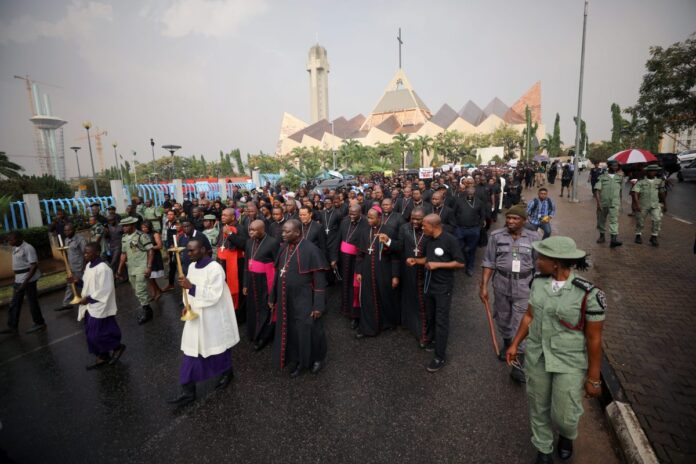Following the United States’ President Donald Trump’s comments about Christian genocide in Nigeria and threats of a military invasion, the Executive Secretary, Nigerian Christian Pilgrim Commission (NCPC), Bishop Stephen Adegbite, has clarified that there is no religious genocide against Christians in Nigeria, urging all international observers, politicians, and advocacy groups to engage with verified facts, and to support initiatives that bring healing, justice, and peace – not narratives that divide.
“What Nigeria needs from the United States and its allies is partnership, intelligence sharing, counterterrorism training, and humanitarian aid, not threats of “gun-a-blazing” intervention,” he said.
Adegbite disclosed this during press briefing on Trump’s comment on Christian genocide and threats of military invasion insisted that terrorism has no religion as both Christians and Muslim faith face insecurity in Nigeria.
“We have taken note of the recent remarks by U.S. President Donald Trump that a Christian genocide is taking place in Nigeria and that the United States may take military action. While we appreciate his concern for the safety of Christians worldwide, it is important to clarify that the situation in Nigeria tragic as it often cannot be accurately described as a targeted campaign of genocide against Christians.
“Christians have suffered deeply but so have Muslims. There is no doubt that Christian communities across Nigeria have endured terrible suffering. Churches have been attacked, pastors kidnapped, and families displaced by terrorists, bandits, and criminal herders. We have mourned our brothers and sisters, particularly in the Middle Belt and the North East, where insurgent groups like Boko Haram and ISWAP have struck mercilessly.
“However, it is equally true that Muslim communities have suffered immensely as well. Entire villages have been destroyed in Zamfara, Katsina, Niger, Sokoto, and Borno States areas with overwhelmingly Muslim populations. Banditry, terrorism, and communal clashes have claimed tens of thousands of lives on both sides of faith, and no community can claim to have been spared,” he said.
According to him, Nigeria is a complex, multi-ethnic democracy with more than 220 million citizens and over 250 ethnic nationalities. It is home to Africa’s largest Christian and Muslim populations living side by side. Any reckless military action or misinformed intervention from abroad could destabilise the entire West African sub-region triggering refugee crises, economic collapse, and extremist resurgence.
“Nigeria’s sheer population size and the ingenuity of its people mean that instability here will ripple far beyond our borders, undermining peace, trade, and democracy across Africa. What we need is strategic cooperation not coercion.
“When a global figure such as President Trump describes Nigeria’s crisis as a ‘Christian genocide,’ it risks inflaming divisions and painting our multi-faith nation as a place of religious war which it is not. Such rhetoric, combined with talk of foreign military involvement, is not only unhelpful but dangerous,” he said.
While saying that his assignment as the Executive Secretary of NCPC is beyond taking Christians to pilgrimage sites, but, as a religious leader, his assignment is to promote peace and unity of citizens of the country.
Speaking on the role of religious leaders in tackling insecurity, NCPC boss affirmed that Nigeria’s religious leaders stand united against violence.
“We, as Christian leaders, work closely with our Muslim counterparts under the Nigeria Inter-Religious Council (NIREC) to foster peace, and mutual mutual understanding. Our message has been consistent and unwavering: terrorism has no religion, and banditry has no faith. When one community suffers, the entire nation bleeds. Our collective work from national interfaith dialogue to joint humanitarian missions reflects our conviction that Nigeria’s path to peace lies in unity, not division.
“The federal and state governments are taking steps. We acknowledge the Nigerian government’s ongoing military operations against insurgent and bandit groups in the North East, North West, and Middle Belt. Several terrorist leaders have been neutralised, kidnappers arrested, and communities resettled.
“While much remains to be done, it is only fair to recognise that progress is being made. The government does not and has never – sanctioned violence against any faith group. Rather, it faces a complex web of security challenges that affect everyone, regardless of religion,” he said.
Adegbite, therefore, urged Christian brethren around the world to continue to pray for Nigeria and pray for Muslim neighbours, who, like Nigeria, bury their dead and long for peace.
He also urged leaders at home to intensify security operations, strengthen justice systems, and ensure that every Nigerian regardless of faith-can live and worship freely.

